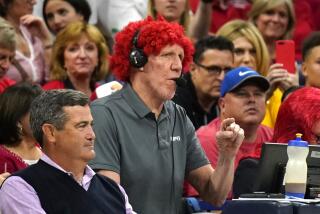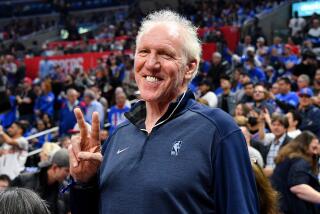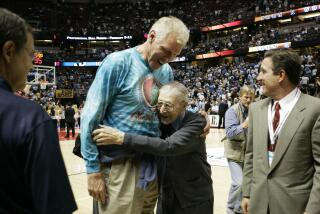In John Wooden’s own words
Even though most people call him Coach, John Wooden prefers to think of himself as a teacher, and not just one who taught hundreds of UCLA basketball players during his 27 seasons coaching the Bruins. His “Pyramid of Success,” a diagram of core values, has helped shape the lives of thousands.
Wooden, 95, who won a record 10 national championships at UCLA and is widely considered the greatest coach in the history of college basketball, is largely unaffected by his success. He still lives in the modest Encino condominium he has called home since 1972. The place is stacked floor to ceiling with plaques, honorary degrees, photos, letters, poems, books ... and, of course, basketballs.
“Bill Dwyre once wrote that I was thrown into the limelight, into a place I never wanted to be,” he said, referring to The Times’ sports editor. “I’d be pleased if that were true. Regardless of how it might appear to others, I’m not comfortable there.”
Wooden spent a morning with The Times recently and talked about his old-school values, his lesser-known love of baseball, the soft spot in his heart for Pauley Pavilion, and his view of the Los Angeles sports landscape over more than half a century.
-------
I keep an old newspaper clipping folded in my wallet. It’s from the time I was offered the manager’s job of the Pittsburgh Pirates. Joe Brown was general manager at the time, and he’s the one who made the offer.
It’s ridiculous. Absolutely ridiculous. But I still keep the clipping just for fun.
“If I should take you up on this,” I said, “who do you think they’d fire first, you or me? If I were the owner, I’d fire you first for hiring me. Then I’d fire me.”
But I still keep the clipping. Baseball, not basketball, was my first love. In the almost 60 years I’ve been in Los Angeles, I’ve seen a lot of great baseball. Although I pull for all the local sports teams — the Lakers, Clippers, Angels — I’ve always been partial to the Dodgers.
When my wife, Nell, and I moved to Los Angeles in 1948, we lived in the same apartment complex as Vin Scully. We were neighbors for a little while. He moved on to a larger, nicer place. Vin is absolutely, unquestionably the greatest sports announcer of all time. I’ve listened to him for years. He’s remarkable. He can do any sport, but in baseball, no one’s close.
Passion for baseball
Why do I love baseball so? Baseball is thinking all the time. Every pitch is different. Every position is different. Every situation is different. There’s the outs, who’s coming up next, who you have in the bullpen. People say it’s slow, but it’s a thinking game.
The athletes who I’ve had the most respect for over the years are all outstanding thinkers: Sandy Koufax, Lewis Alcindor, Bill Walton, John Stockton, David Robinson. In the USC football I’ve seen lately, I like the way Matt Leinart thinks.
I was always a Dodger fan. I went to a lot of games and got to know most of the players. I was in their dressing room a lot. I had met Walter Alston, the manager, and knew him before I came to UCLA in 1948. They had a couple players from Indiana, my home state, Gil Hodges and Carl Erskine, and I knew them. I knew Don Drysdale, and I knew Sandy.
If I had a favorite Dodger, it was Sandy Koufax. He was modest and unassuming, and he left at the height of his career when he could have played longer. He had enough strength to walk away and not stay too long as some do.
I first got to know him when he went to the University of Cincinnati on a basketball scholarship. He’s a big basketball fan. I sat with him a few years ago at a Final Four in Indianapolis. We weren’t there together, but it just so happened that we were seated very close together. He’s a shy type of person. We just greeted each other. We’d met before, of course.
A lot of Dodger memories have stayed with me over the years. I’ll never forget the night they honored Roy Campanella. The Coliseum was full, and they had candles that lighted up the night. It was sort of eerie.
Before Dodger Stadium was built, the team played at the Coliseum. I remember Wally Moon, who was left-handed, hitting a little pop fly to left and it would be a two-base hit. And then Duke Snider would hit one twice as far into center field and it would be caught for an out. I remember Duke hurting his arm trying to throw a ball out of the Coliseum.
People have asked how my life might have turned out had I pursued baseball instead of basketball. I don’t like to look back. According to others, though, I had some ability in baseball as a youngster. I was a shortstop and I had a great arm, at least that’s what people told me. But I got to my freshman year in college and I turned into a fastball and got hit on the shoulder. I went from having a great arm to no arm at all. That ended my baseball.
In recent years, I’ve enjoyed following the Angels too. I’m very fond of Mike Scioscia, and I’ve been invited up to the owner’s box to sit with Arte Moreno. I’m very impressed with him. When the Autrys owned the team, I sat with them on occasion.
I enjoy watching baseball far more than watching professional basketball. I’ve followed the Lakers. I’ve known a number of them. I went to a lot more games in the early years. I’ve gotten to a point where I don’t care much for the NBA. I think it’s become too much about the individual, too much one-on-one, too much showmanship.
I didn’t like that Showtime business. I don’t like showmanship. For example, as great a ballplayer as he was, and there’s no question about his greatness as a player, Magic Johnson was not my type of player. I’ll take John Stockton. That’s the type I love. I’ll take Jerry West. I’ll take Oscar Robertson, Larry Bird, Tim Duncan, David Robinson. Those are the ones who appeal to me.
No grandstanding
One of our players at UCLA a few years ago intercepted one at center court and he was all alone, nobody within 25 feet of him. He jumped up, and instead of just laying the ball in the basket, he turned a complete 360 and threw it back down over his head through the basket hard. The fans were stomping and roaring. Somebody tapped me on the shoulder and asked, “What’d you think of that, Coach?”
And I said, “I’d have had him out of there before he hit the floor.”
The better talent you have with which to work, the more difficult it is as a coach. The greater they are as players, for the most part, the more inclined they are to try to do it alone.
As a teacher-coach, I was blessed with two of the greatest players who ever played who were completely unselfish and team-oriented: Lewis Alcindor and Bill Walton. It was obvious in practice and in games. Sure, they liked to score. But that was never first in their mind at all. “Me” was never first in them. It was always “we.” That’s pretty wonderful.
Phil Jackson
One of Phil Jackson’s strengths as a coach is his ability to get players to accept their roles. That’s one of his greatest assets. That’s not easy to do. He had a little trouble with that a few years ago with Kobe Bryant and Shaquille O’Neal, but for the most part he’s done a very good job of that.
Kobe is gradually growing up. He’s made some mistakes, some horrible mistakes. He’s extremely talented. You can give Jerry West the credit for seeing the possibilities early on and making the trade to get him. He’s lived up to what Jerry thought he was, and maybe even better. Talent-wise, he’s just amazing.
The box office depends on individuals. There aren’t too many people in the Laker organization who are unhappy that he gets the attention that he does. They want somebody who gets attention, even if not all of it is good. I think he made some mistakes. We’re all imperfect. Mother Teresa said that forgiveness sets you free.
As for Shaquille, I think he’s always going to be a kid. As great as he is, I don’t like him saying, “Everybody knows who the MVE is — the Most Valuable Ever.” That’s really childish in many ways. I wouldn’t pick him over a number of other centers if I had a team of my own. But at the same time, I think he’s the most valuable player in the game.
In my career as a teacher and coach at UCLA, the most valuable recruit we ever lost was Paul Westphal. He’s the one who got away. He attended all my basketball camps, and I was sure he was going to come to UCLA. He changed his mind at the very last moment and went to USC. Paul has said that because we were doing very well at that time, he thought it would be better to help somebody else get in that spot and knock us off rather than just coming to UCLA and help us continue.
I’ve seen a lot of basketball players, and Paul Westphal is the only one who from what I saw was truly ambidextrous. I’ve had a lot of them who were pretty good with the off-hand. But you could tell whether they were left-handed or right-handed. With Paul, I believe that he could have shot with either hand and it would have looked exactly the same.
USC has had more than its share of great players and coaches over the years. I had tremendous respect for Rod Dedeaux, the legendary baseball coach, and I was very sad about his recent passing. We were friends.
And then there was John McKay. He had a great sense of humor. When I think about him, I think about the time I was in the airport and someone came up to me and said “You’re John McKay.”
And I said. “No.”
“I know you,” he said.
“No,” I said, “you’re wrong.”
And he said, “If you want to go incognito that’s all right with me. But I know who you are.”
So I just said, “OK, you got me.”
John and I were about the same height and had similar complexion. Maybe our noses were somewhat similar. I wouldn’t say we looked alike, but I can see how someone might confuse us.
For so long, people have looked at Los Angeles as a USC football and UCLA basketball town. Maybe one day that will change. Something I hope never changes, or at least doesn’t change for a long while, is Pauley Pavilion. I think it’s great the way it is. I’m responsible for the main floor not being in the center. Because when it was built, I wanted a full-sized freshman court that went perpendicular to the main court. I had them put in a curtain that could drop down and separate the courts. Our freshmen could practice at the same time as the varsity. The freshmen started a little later, and they could come over in their last half-hour on the main court and I could be with them.
You may notice that the scoreboard’s not over the center of the main court, and there’s much more room between the bleachers on one end than the other. So they’ll move that, and they’ll add some more seats. I can understand why they’re doing that.
Pauley Pavilion was the greatest thing to ever happen to me at UCLA. I hate the thought they were considering tearing it down. But they’ve decided now they’re not going to tear it down. I’m glad about that. They say the restrooms should be updated. I haven’t been in them, so I don’t know. But that’s OK. They were talking about luxury boxes and whatnot. I don’t know about that.
Shifting priorities
Sports have changed, and I understand that. It’s big business now. More than ever, athletes are living in a fishbowl. I was never a supporter of allowing reporters in the locker room after games. But I understood it. My very last year of teaching, the NCAA tournament committee passed a rule that you had to permit the press in the locker room. My feeling was, if they think it’s that important and it should be done, I’ll do it. Did I approve of it? No. But I understood, and I didn’t complain.
But when the chairman of the tournament committee said, “That’ll take care of Wooden,” then that hurt. Because I had been in that Final Four a few times, and I don’t think anyone from the media or the tournament committee could say that I ever did anything but be accommodating. I knew coaches who didn’t come to the meetings they were supposed to and various things. But I always did. I didn’t send assistants or somebody else to represent me. I was always as cooperative as I could be.
Did that play a role in my decision to retire when I did? Well, you can’t be sure about your subconscious. But was that hovering in the back of my head somewhere? I don’t know. I can’t say it was or wasn’t. I had no idea from the outset that I would be retiring so quickly. I expected to teach two more years, no more than three. But then just like that I decided this is the time. After we had beaten Louisville in the semifinal game, as I was walking off the floor, I just decided now’s the time to get out.
That’s when I went to the dressing room and congratulated my players. I told them it was a wonderful game, a close game in which both teams played well. I just told my players, “It’s a wonderful game. I’m very proud of you. Regardless of how we do Monday night against Kentucky, I want you young men to know that I’ve never had a team that has given me more satisfaction. You haven’t caused me trouble on or off the floor at any time this year. I’m very proud of you. And that’s a very nice thing to say about the last team that you’ll ever teach.”
They were all stunned. Nobody knew. I didn’t even know it myself until a few seconds before I did it. I just decided like that.
Then I went to the press, and I thought eventually someone’s going to bring up a question about retirement. And they did. I said the same thing I said to my players.
Some people said, “Well, I knew he was going to do it.”
I didn’t even know. Maybe they knew more about it than I did.
Although I’ve never regretted walking away from coaching when I did, the one thing I’ve missed is practices. I love to teach. Duke’s Mike Krzyzewski had me talk to his team a few years ago before the Final Four. I miss that. Lute Olson has brought me down to Arizona to talk to his team and watch practice. I love that.
On death
A couple of years ago, I spoke at an event for Costco, where one of my former players, Swen Nater, is an executive. Swen is also a poet, and a beautiful person inside and out. Someone asked me, “Coach, are you afraid of death?” It was quite a question to ask a 93-year-old man.
I said I’m not afraid of it. I’m not going to intentionally try to hurry it up. But I’ve been blessed with a wonderful place to live, where in an hour or two I can be at the ocean, in the mountains, in the desert. I can be at any sort of sporting event, a play, a movie. My family, my children, my grandchildren, my great-grandchildren are all within an hour or two of me. I’ve really been blessed. And I said, “Out yonder, I’ll be with Nellie again.” That’s all I said.
So a couple days later I got a poem from Swen called “Yonder,” and it refers to my wife, whom I lost in 1985. It reads:
This article was originally published in the Los Angeles Times’ 125-year commemorative section on March 30, 2006.
More to Read
Go beyond the scoreboard
Get the latest on L.A.'s teams in the daily Sports Report newsletter.
You may occasionally receive promotional content from the Los Angeles Times.











